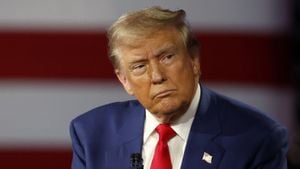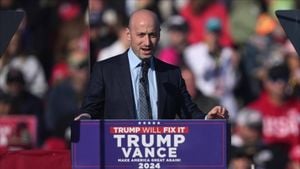Donald Trump has officially appointed former New York congressman Lee Zeldin to lead the Environmental Protection Agency (EPA) as part of his new administration, marking another bold step in the former president's bid to reshape the American regulatory environment. Zeldin, who served as the representative for New York’s 1st Congressional District from 2015 to 2023, is recognized for his close ties to Trump and his staunch support for deregulation.
President-elect Trump touted Zeldin’s appointment, stating he would cause "fair and swift deregulatory decisions" aimed at invigorat...ng American business, all the whilst adhering to the "highest environmental standards." This, of course, has raised eyebrows due to Zeldin's previous voting record which reveals minimal support for stringent environmental protections.
Trump announced Zeldin's selection on social media, emphasizing the dual objectives of nurturing economic growth and ensuring clean air and water. It’s worth noting, though, the irony as the selected candidate has not shown significant public support for environmental initiatives during his political career.
Throughout his tenure in Congress, Zeldin's focus was primarily on issues such as military affairs, national security, and U.S.-Israel relations rather than environmental policy. His actions suggest he will likely embrace the deregulatory agenda promised by Trump, potentially unraveling many of the environmental protections established under Biden.
Critics are quick to point out Zeldin's dismal lifetime environmental score of 14% from the League of Conservation Voters, indicating his support for environmental issues has been virtually nonexistent. His notable vote against certifying the 2020 election results also positions him as a controversial figure within the GOP.
Among environmental advocates, concern is mounting about Zeldin's next steps as head of the EPA. Barry Rabe, professor of environmental and public policy at the University of Michigan, comments on the significant changes he anticipates during Zeldin’s leadership, particularly concerning the Clean Air Act and the future of emissions regulations. Rabe suspects Zeldin may challenge various interpretations of environmental laws implemented by the previous administration.
One of Zeldin's standout moments came during his failed bid for governor of New York, where he pledged to overturn Democrats’ fracking bans. This intention reflects his pro-fossil fuel stance, which aligns well with the interests of Trump's base. During his time as congressman, he was also instrumental in introducing legislation aimed at promoting fishing rights, which, to environmentalists, sometimes collided with conservation efforts. Zeldin’s push to allow striped bass fishing faced backlash from environmental groups who argued it risked the species' sustainability.
Zeldin's close relationship with Trump is seen as both a strength and a potential liability. Those aligned with conservation efforts are hopeful he might leverage his familiarity with the administration to advocate for local environmental issues, particularly those pertaining to Long Island. Bob DeLuca, president of Group for the East End, noted mixed feelings about Zeldin's environmental stance, stressing the concern his tenure could pose for conservation efforts.
Efforts to convey the doubts surrounding Zeldin’s appointment are echoed by leading environmental groups, which assert this administration's inclination to diminish the agency’s regulatory capacity. Nicole Cantello, president of the American Federation of Government Employees Local 704, expressed fears based on the legacy of the previous Trump administration's treatment of the EPA, which included removing climate change references from official acknowledgments and slashing enforcement actions against polluters.
Meanwhile, Zeldin's own statements reflect unwavering support for transitioning America back to energy dominance, showcasing his ambition to restore policies favoring fossil fuels and energy independence. He passionately argues for revitalizing the U.S. auto industry, emphasizing creating jobs as one of his top priorities.
With Trump reclaiming the presidency, experts speculate about the potential for swift changes at the EPA, including attempts to roll back the stringent standards set by the Biden administration. Zeldin stated on a recent television appearance, “Day one and the first 100 days, we have the opportunity to roll back regulations forcing businesses to struggle.” This proclamation serves as shorthand for the type of deregulation he aims to advance.
One of the anticipated shifts under Zeldin's leadership involves testing the boundaries of executive power, especially with Republicans now controlling both chambers of Congress. Observers are wary about how far Trump and Zeldin will go to slash regulations and pursue their agenda without hindrance.
At present, experts and environmentalists alike are on edge as Zeldin prepares to assume his new role. With legislative initiatives having been previously set, Zeldin may face difficulty reversing policies passed by Congress, especially those shaping the course of climate and sustainability investment.
Nevertheless, if the past is any teacher, the lips of environmental advocates are tightly wound as they ready themselves for what could manifest as the greatest rollback of climate protection regulations witnessed during any administration.
Adding another layer to this complex scenario is Zeldin’s prominent association with the America First Policy Institute, founded by Tim Dunn, the influential Texas oil billionaire known for backing pro-fossil fuel policies. Critics believe Zeldin’s appointment signals the true intentions of the incoming administration: to serve the interests of supporting industries rather than the health of the environment.
Despite widespread concern and scrutiny surrounding Zeldin’s appointment to this pivotal role, Trump remains steadfast, rallying his base around the promise of economic growth and regulatory freedom. The stakes are high, with environmental advocates and ordinary citizens alike holding their breath for what lies around the corner once Zeldin officially takes the reins at the EPA. With the new administration gearing up, the looming question now is: how will Zeldin's leadership reshape environmental standards and regulations for the coming years?



